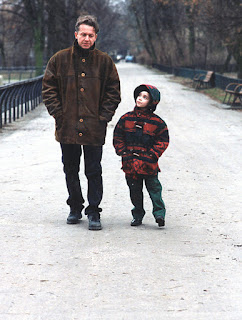Polish Cinema: Tato (Maciej Slesicki, 1995, Poland)
Maciej Slesicki's 1995 Tato is a great example of post-communist commercial cinema, with none other than the quintessential 1990s Polish leading man - Boguslaw Linda - taking on the role of the film's protagonist. The film was the only Polish-language film to be among the top 10 grossing films at the Polish box office in 1995, and it's easy to see why. The film is a pure exercise in melodrama, something of a cross between Kramer vs. Kramer, Fatal Attraction, and a telenovela.
The film tells the story of Michal (Boguslaw Linda), a cinematographer who is in a bitter custody battle with his wife Ewa (Dorota Segda) over their daughter Kasia (Ola Maliszewska). From the beginning, Ewa is shown to be deeply unstable. The portrayals of women in the film barely rise above the level of caricature - especially the mother-in-law of Michal, who is a witch-like figure. What seems to start as a domestic drama eventually becomes almost comedic as Michal ends up kidnapping Kasia. This comic element changes rather dramatically in the third act, wherein the film becomes a thriller with quite a lot of blood and violence. The finale is truly over-the-top.
While Tato is a rather heavy-handed film, it is also very entertaining - which probably explains its success. The economic crises of the post-communist era left many men feeling emasculated, and this crisis around masculinity is manifested in the film. One of the main characters in the film is Cezary Kujawski (played by legendary Polish actor Cezary Pazura), who runs an organization fighting for the rights of fathers. The film's main weakness is that it portrays the men as too sympathetic and the women (with the exception of Krystyna Janda as Michal's lawyer Magda) as very unsympathetic. Slesicki would follow this film up with another starring Boguslaw Linda - Sara (1997).
6/10




Comments
Post a Comment